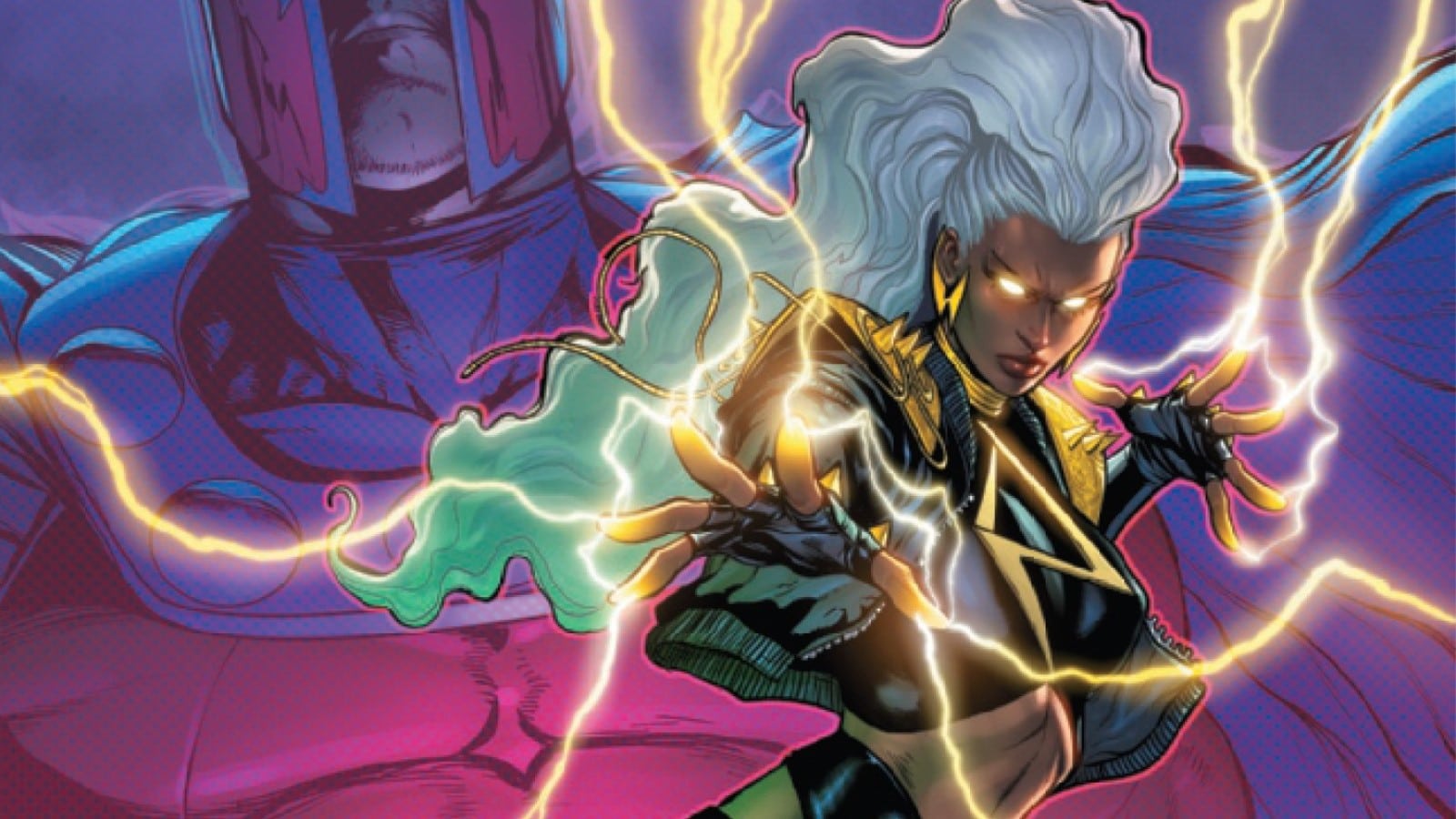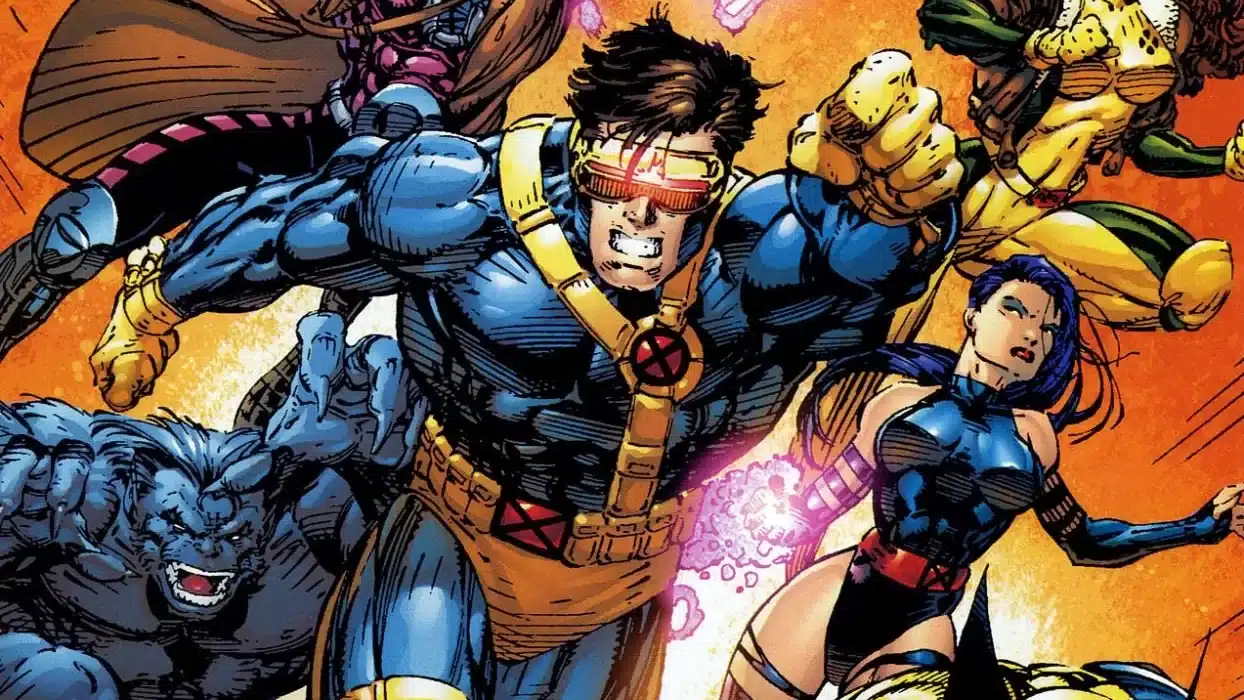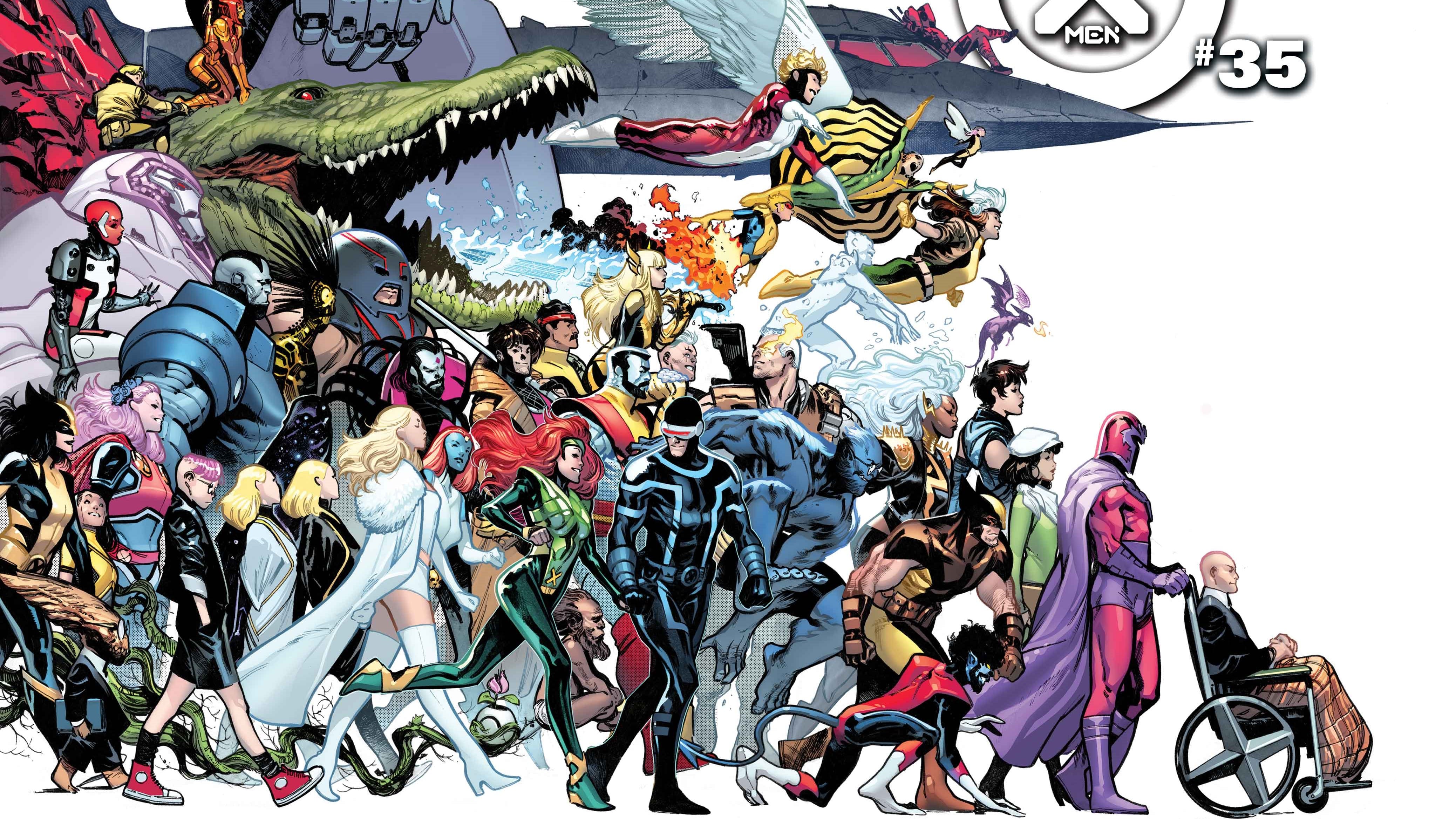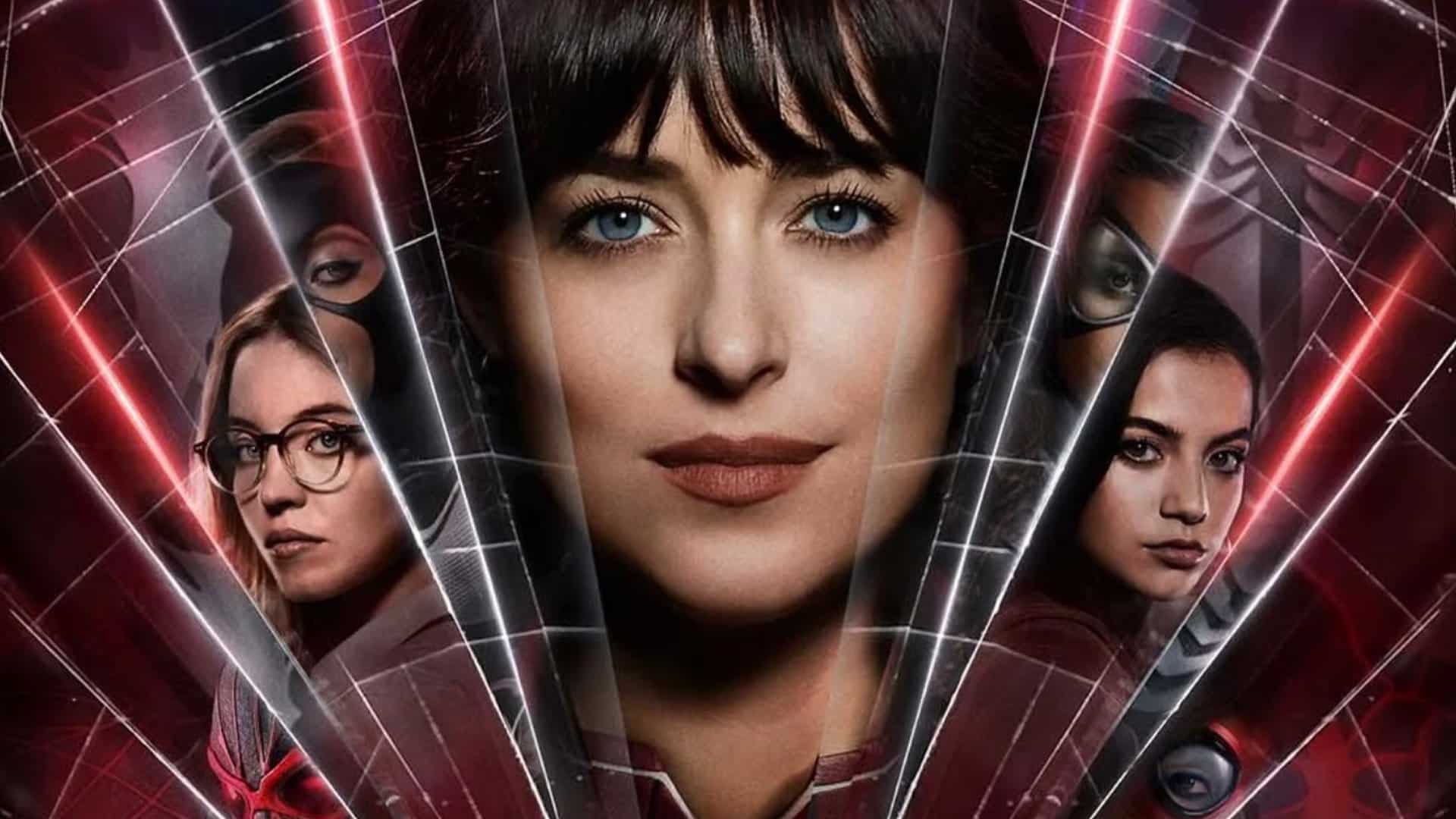Art by Aaron Kuder
The X-Men are dying. At least that’s what message boards would tell you. A large subset of fans feel hated and feared in the same way as the merry mutants and nothing can alleviate those fears. The rise of the Avengers in the last decade and the separation of film rights in the world of Marvel (which you can read more about in my X-Men movie history post) has put fans on edge. Right or wrong you can’t talk about X-Men without someone screaming that the sky is falling, and I want to change that.
In this article I will lay out the concerns and provide reasonable explanations for the actions that have been taken. But before we can do that we need to establish one assumption, Marvel makes decisions that are in the best interest of the stock holders of Walt Disney Co (NYSE: DIS). If you are someone who thinks that a $52B company would allow one of its divisions to operate against their best interest over movie rights then none of the evidence I present can ever sway you, and I am sorry you live with such a chip on your shoulder.

I also want to stress that any data related to the sales of comics comes from the estimates of the direct market sales (Diamond to comic shops) and should be considered as both directional and incomplete. These numbers cannot tell the full story as it doesn’t look at how many Wednesday warriors actually buy these books, nor does it take things like digital sales or collected editions into consideration. They can give us an indication of the market performance but nothing more.
So before we can refute these claims we need to establish them. The jist of the argument is that Marvel is working to minimize the importance of the X-Men, to the point of nonexistence, as a move to either spite the owners of the X-Men film rights or to devalue the rights enough for Fox to sell them back to Marvel. Specific evidence includes:
- Banning the X-Men from their merchandise and other media
- Banning creators from making new mutant characters
- The retconning of some previous mutants
- The increased importance of the Inhumans and pivoting them into the role the X-Men have traditionally held
- The minimized number of X-Men titles
- The perceived low quality of those titles
- The in-story attacks against mutants as a race
As we continue I will systematically discuss or refute these points and I am open to discussion on my reasoning.
Banning the X-Men from Merchandise and Other Media

Something’s missing…
This is what detractors use as the most damning evidence against for the Death of the X-Men. Marvel has been deemphasizing the X-Men in their merchandise and other media efforts. Shirts with classic comic book art have been edited without X-Men (as well as their Fox property brothers the Fantastic Four). A wildly known mass market poster was updated without the mutants in any significant position. The sequel to game Lego Marvel Superheroes made sure that no X-Man was included. Even the recent Marvel Now promotional book failed to include information on the current X-Men books. This is an obvious sign that life is imitating art and Marvel is trying to hold their own M-Day. Right?
Well let’s look at this from the perspective of a bean counter. Senior Marvel editor Tom Brevoort confronted this head on in 2014.
He makes two important points to consider when making an economic decision, Marvel has limited resources (whether people want to believe that or not) and Marvel needs to consider the implications of previous contracts. While the specific details of their dealings are private, it is pretty obvious that someone other than Marvel gets a cut of X-Men merchandise. That means Marvel only needs to sell a smaller percentage of Iron Man, Guardians of the Galaxy, or Hulk merchandise to get the same profit. It’s easy to see why Marvel is deemphasizing mutant merchandise.
The other key factor to look at here is advertising. Marvel is blessed with their cinematic universe which is one of the biggest and best ad vehicles in history. A kid can watch Iron Man 3 and run out to the store to beg his parents to buy an action figure of one of the 20 armors in the film. The X-Men films don’t have that toyetic feel to them, they are more grounded in realistic looks with heroes often wearing plain clothes and not using good vehicles and gadgets. The MCU has huge synergy potential with the rest of the Marvel branding machine and it would be foolish not to maximize that.
That being said, it isn’t as bleak as the most fearful would want you to believe. Right now the Marvel Legends line, a higher end, more collectible, action figure line is promoting the X-Men and currently on the shelves of your local Wal-Mart. A second wave was just announced recently at San Diego Comic Con. The wildly popular mobile game Contest of Champions includes a bunch of X-Family characters and has been keeping up with the latest changes in comics like Old Man Logan or Laura as Wolverine. Sure it isn’t the onslaught of merchandise that the mid-90’s were but it is a big step.

Banning creators from making to mutant characters
So back in 2014 X-Men visionary Chris Claremont was a guest on The Nerdist Comics Panel, partially as promotion for his overlooked Nightcrawler series. Few people noticed until about a month later when Bleeding Cool Editor-in-Chief Rich Johnston happened to take a listen and posted an excerpt transcript of what he said
I have to say quite honestly as I understand it now the X department is forbidden to create new characters. – Chris Claremont
When one of the most important figures in X-Men history, someone currently working on a book for the X-Men editorial, says something like that you have to believe it right?
Well as far as Claremont goes, this was more New Exiles than Days of Future Past. In the last couple of years creators have continued to make more mutants. In Extraordinary X-Men, Jeff Lemire has crafted a big story around the new mutant Spana. Bendis introduced new character late into his run. Even Claremont himself used new character Rico and Ziggy in his Nightcrawler book. Saying that Marvel isn’t allowing mutants is just showing ignorance.
There is a pretty reasonable explanation for editorial wanting to limit the creation of new mutants though. There’s a hell of a lot of them. Even after the mutant race was decimated in House of M there were sill 198 of them, not counting the 20 or so characters who didn’t just disappear when they got depowered. A common fan complaint is that personal favorites don’t appear anywhere. From a fan service perspective, it makes more sense for the X-Office to try and encourage its’ writers to use existing character and not create new ones.

Art by Marko Djurdjevic
And this isn’t even close to all the characters
The Retconning of Some Previous Mutants

Art by Daniel Acuña
There is no denying that several characters who were known as mutants for a long time got stripped of the title over the last few years. Cloak, Dagger, Squirrel Girl, Scarlet Witch, and Quicksilver are all well recognize character who lost their mutant status, but is that such a bad thing? Cloak and Dagger were originally retconned into being mutants to capitalize on the X-Men’s popularity. The only time it has ever been relevant was during the Utopia arc in Dark Reign. Squirrel Girl was a mutant as a throwaway line because Steve Ditko wanted to show how not to create a character. It has only mattered once as a last page joke in GLA. Scarlet Witch and Quicksilver are a different story. Both started as X-Men villains, and the retcon for them being Magneto’s children defined their characters for years. Wanda, however, has rarely been associated with the mutants; House of M being the only significant example. Even when mutants were supposedly unable to sacrifice themselves to Onslaught, the writers hand waved it to allow Scarlet Witch to die. Similarly, Quicksilver has been associated more closely with the Avengers than the X-Men over the years. His biggest role has been serving with X-Factor in the 90’s and as an antagonist after M-Day. While I am not a fan of the change, I am willing to consider it a story choice rather than a vendetta against mutants.
The Inhumans

Art by Aaron Kuder
A silver age team of freaks and weirdos with a secret society that was shunned by those who don’t understand them created by Stan and Jack. Sound familiar? They are the biggest target of the hate by paranoid X-Men fans, and Marvel has leaned hard into that angle. They are the Inhumans and any argument about the treatment of the X-Men has to include them. It is no secret that Marvel has tried to develop the Inhumans as another franchise in their portfolio. With the release of the Terrigen Mists at the end of Infinity the Inhumans have been growing in number, using several tropes that have been long associated with the X-Men. Is Marvel trying to replace the merry mutants with these Uncanny Inhumans?
This argument makes one fatal flaw, it assumes comic sales are a zero sum game. Marvel would love the Inhumans to be a huge brand, they previously announced a film for them after all. When they launched the big Inhumans book after Infinity, it was supposed to be with the A-list creative team of Matt Fraction (who left the book over creative differences) and Joe Madureira. But none of that hurts the X-Men books, who were spearheaded by Marvel golden boy Brian Michael Bendis at the time. One sale of All-New Inhumans doesn’t take away a sale from Uncanny X-Men, it just becomes part of the high tide raising all ships.
Even if they were intended to be a replacement for the X-Men, it isn’t working. When you look at the Diamond numbers (starting at the 2012 Marvel Now relaunch), X-Men are killing the Inhumans in both overall sales and average sales per issue.


You will notice the Inhumans have beat the X-Men once in the last 3 years in total sales, October 2015. That was a month that included only a handful of X-Men Secret Wars miniseries on their last issues compared to the relaunch of the Inhumans books during the All-New All-Different Marvel. There have been occasions where the Inhumans have beat the X-Men on a bang for your buck style average sales comparison but those were always driven by odd circumstances like new #1’s for Inhumans in the same month that the X-Men had shipping issues. One potential concern could be the decrease in the total sales for the X-Men over time, but there is a reasonable explanation that ties into the next point.
The Minimized Number of X-Men Titles
When the All-New All-Different Marvel line was announced there was concern that the X-Line had been reduced to only 5 books, the lowest the line had been since the 80’s. To the average person that seems like a concern however the economist knows about a little something called marginal analysis. Marginal analysis requires decision-makers to evaluate whether the benefit of one more unit of something is greater than its cost. Essentially it asks if you should spend a unit of resource (a creative team) to make additional product (in this case another X-Men book). To maximize profit Marvel has to choose whether to make another X-Men book, or try something different with their resource. I took a look at the performance of the X-Line since the first Marvel Now and you might be surprised by what I saw.

Marvel has released between 4 and 26 X-Men issues a month in the last few years with an average of 17 issues before the relaunch and an average of 8 since. Obviously this is limited data but it tells us something directionally, Marvel is making a choice the maximize their overall profits at the expense of additional X-Books. This may be something that bothers fans of the mutants but it is obviously the correct economic choice and it makes sense. I am (obviously) a pretty big X-Men fan but it is a huge financial burden to spend almost $70 a month to follow all the mutant adventures. I’m a fan of a little variety and sometimes that includes reading thing that don’t involve people with knives in their hands. Marvel is seeing this and investing in other brands, like the Inhumans. Most people are more likely to buy Ms. Marvel than an 8th X-Men book. That’s what Marvel is trying to capitalize on here, not building up the Inhumans to replace the X-Men, but to maximize their profits.
The Perceived Low Quality of the X-Men Titles
This is one of the most laughable points in my opinion. The theory goes that Marvel knows the X-Books will sell so they devised a plan:
- Continue to sell the X-Men line
- Put out a low quality product to lower sales
- Cancel the X-Men line due to low sales
- ???
- Get the rights to X-Men movies from Fox
- Profit
I mean come on, does that make sense to anyone? Marvel has invested in this family of books and that is evident by the creators they have put on the titles. Bendis is someone who Marvel values highly and he was on two books for four years with a killer line up of A-list or rising star artists. Lemire, Bunn, and Hopeless are all creators that are in demand and Marvel put them on the X-Men. Humberto Ramos went from being the artist on Amazing Spider-Man, one of Marvel’s top selling books, to the flagship X-Men title. Andrea Sorrentino is one of the most buzzed about artists of the last five years. Complaints can be made about Bagley and Land but they are both artists who Marvel has put much trust in over the years. When you look at the creative investment Marvel has put into the X-Men it is silly to imagine everyone involved would want to put out bad product. These are freelancers, not Marvel employees, so you either have to believe they would spoil their brand by putting out bad product just because Ike Perlmutter said so, or they are trying their best and you just don’t like the stories they are telling.
And even if this plan was in place, even if Marvel kills the entire X-Office, how does this hurt Fox? It isn’t like there is a dearth of stories in the X-Men’s fifty-year history to adapt. Even if they did run out, Hollywood, California has enough writers that a Fox executive just needs to walk into the nearest Starbucks to get years’ worth of scripts. Putting out bad stories wouldn’t even hurt the X-Men films as a brand. 50,000 people buy the newest issue of Uncanny, millions saw X-Men Apocalypse on opening weekend. The comics aren’t the popular zeitgeist of X-Men, the films are. Putting out low quality titles only hurts Marvel’s bottom line, and Fox wouldn’t even notice.
The In-Story Attacks Against Mutants as a Race
As of the publication of this article Wolverine, Cyclops, and Professor Xavier, leaders of the mutant community, are dead. The X-Men are facing an extinction level threat from the Inhumans. In the midst of all of this anti-mutant sentiment is rising. It seems like the X-Men aren’t even safe in their own book, and the announcement of Death of X has only raised more concerns. Could the hardships facing mutants be a sign that Marvel is setting them up for extinction?

To tackle this criticism, we need to take a look at three act story structure. It postulates that a good story has three essential parts, set up, confrontation, and resolution. Magic: The Gathering lead designer, and former Rosanne writer, Mark Rosewater describes it as this, man climbs up a tree, throw rocks at man, man climbs out of tree. A story needs all parts to elicit the correct emotional response, but comics have an interesting problem. Comics, or the ongoing narrative, are stuck in the perpetual second act, confrontation. The character’s and their general struggle was set up years ago, and while individual arc may get resolved, there is never true resolution for the ongoing struggle. Batman can never strike fear into the hearts of all criminals, Dr. Doom can never keep and control the world. So where does this leave the X-Men?
The X-Men’s core struggle is as a minority group, protecting a world that hates and fears them. They will never have peace, and they will always struggle. As much as fans might think they want it, mutants can never be accepted, not for long. There will always be the next Mutant Registration Act, the next Legacy Virus, the next destruction of Genosha, the next Decimation, and yes, the next M-Pox. Getting treated poorly, in universe, is built into the genes of the characters. This isn’t something unique to the X-Men and it isn’t a sign that Marvel is trying to phase them out. Daredevil is a fantastic example of this happening to other characters, the best arcs of Daredevil involve dismantling his life. They throw rocks at him. It isn’t because Frank Miller or Brian Bendis dislike Matt, in fact they love him, they just know that a good story involves struggle.
And that is what is happening with the X-Books right now, they are telling a story of struggle. It isn’t malice, it isn’t petty corporate greed, it’s just storytelling. The story telling is a bit controversial but Tom Brevoort has come out and said controversy is by design, it sells books. That isn’t the only way Marvel is using the X-Men to sell books, since the relaunch last November the X-Men have been set up for three big comic events (one of which ties into the recent Fox film). They have also been the center of three different Marvel wide variant cover programs. They are relying on X-Men and their struggles to build sales, not trying to commit mutant genocide.
I’ve spent three thousand words saying something that most of you readers already believe. This choir has been adequately preached to, but I hope you have some ammunition to battle these claims. I know there are some reading this that it won’t matter to, you believe that, beyond all evidence to the contrary, Disney is a vindictive master who will cut off their own nose to spite their face. And to you guys I feel sorry, nothing will make you happy and you will let a media franchise cause you more stress than most could ever imagine. The last group of you have read rumors, articles posted on trusted websites. I hope this article has provided you with evidence, given you something to think about when someone yells that the sky is falling.
The X-Men aren’t dying, they are just doing what they have always done. They are protecting a world that fears and hates them, while lining the pockets of those in control.

Art by Luke Ross and Matt Milla
Zachary Jenkins is the head writer and reluctant EiC of Xavier Files. His wife lets him spend too much money on books about mutants. Follow him @Xavierfiles on twitter and tumblr.
Zachary Jenkins runs ComicsXF and is a co-host on the podcast “Battle of the Atom.” Shocking everyone, he has a full and vibrant life outside of all this.







